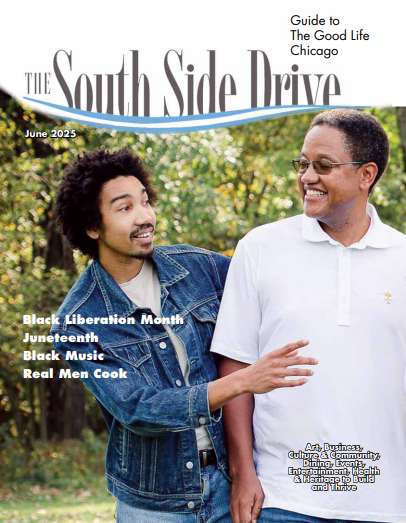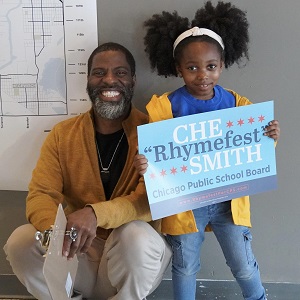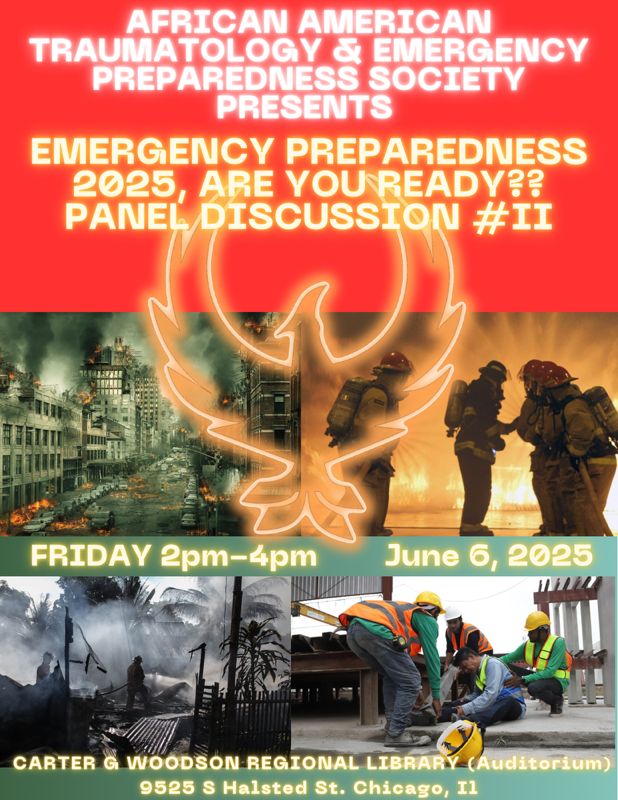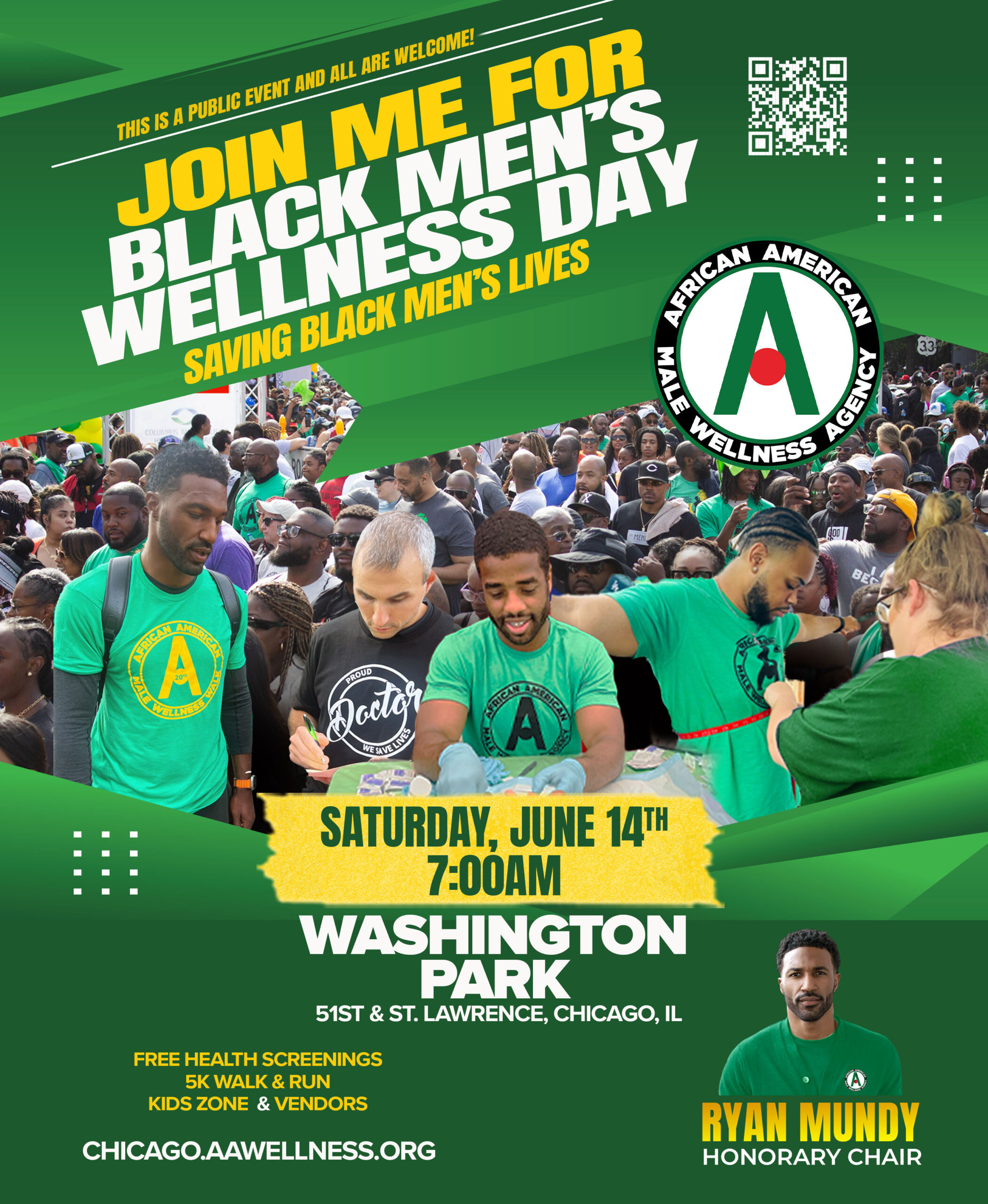Che “Rhymefest” Smith is a grammy-award-winning rapper and songwriter. He also received a Golden Globe Award and an Academy Award for Best Original Song. He was the subject of a Showtime and Break Thru Films documentary, “In My Father’s House.” He made his film debut, appearing in a 2018 motion picture. In 2006 he was invited to the British House of Commons to discuss hip-hop and policy with David Cameron. In 2016 he hosted a “Truth & Reconciliation” event series to enhance awareness about gun violence in Chicago.
Wouldn’t it be great to have someone like Che on the Chicago School Board?
Of course it would. That’s why Chicago voters elected Che “Rhymefest” Smith to represent Chicago’s tenth district on its first elected school board.
Rhymefest hails from the South Side of Chicago. He credits his success to those elders who taught him well. He tells us, “I had good teachers, like Dr. Carol Adams, like Donda West, like Dr. Timuel Black, like Josie Childs, like Yvette Moyo and Haki Madhubuti And even though they didn’t understand rap music, they understood community, they understood humanity, they understood history and how we got to where we were and where we are. And what they would tell me was, ‘If you’re going to rap, put all of that in your rap. Put who you are really in your rap. Put the history the real history of Chicago—in your rap. Talk about Mayor Harold Washington and what made him the kind of man he was.’ I believe the best teachers are the ones that are not in the traditional school settings. Dr. Cornell West was one of my teachers, but I never went to one of his classes. I reached out to him. I reached out to the smartest man in town, Salim Muwakkil. If people knew better, they’d all be going to get wisdom from him.”
Che believes that different teachers come into our lives in different ways, and they always come exactly when you need them. He said,
“Take for instance, the time I got to spend with (The Honorable Minister) Louis Farrakhan when I was twelve or thirteen years old. I would sit inside the Mosque where he would come to speak, and I wanted to learn more from him, and lo and behold, God put him in the same room or at the dinner table where I could ask him questions.”
When it came to Reverend Jesse Jackson, Che was also intentional about seeking wisdom from this Civil Rights giant. “I saw in the early 2000’s how young Black folk turned against the Reverend. We didn’t understand what he had done for the community and some of those of my generation (GenX) were talking bad about this man who had freed hostages around the world, who had created the Black middle class by ensuring that Fortune 500 companies gave us a chance to own our own McDonald’s franchises. He fought apartheid in South Africa. I wrote him a letter apologizing on behalf of young Black America. And when he received my letter, he called me to his office in Operation PUSH and began teaching me.”
Che told me that rap gave him the opportunity to travel the world. “I got to see how other people lived in other parts of the world. I got a chance to see how other people were suffering. We think we have problems that are so complex, but I started seeing people in other countries solve those problems with common solutions. With village. With cooperation and collaboration. I got to learn things in different parts of Europe and Africa and Asia, and I had the opportunity to bring that knowledge back to Chatham and South Shore and Woodlawn, and that’s what got me interested in using the mechanism of politics to reshape our communities from a global perspective.”

Che brought more than knowledge and wisdom from around the world. “I work with young people around the world, and from those young people, I learn different styles of music. My wife and I have a school in Arusha, Tanzania where we’re teaching them what we know and they’re teaching us what they know.” During one of their visits, he met a young man in Senegal named Hasaan. “Hasaan told me that one day he would make it to America and he would free his people from poverty. I told him that from there he could walk to America. And he literally walked through twenty countries to get here. He walked with Cartel at his back, he was once robbed by the Cartel. He walked up mountains and down ravines. He swam through rivers. He saw people die. He slept in jungles with scorpions, spiders and snakes. And he eventually got here because he saw America as the promised land. That’s why I can’t listen to people saying America is nothing. People die to get to this country. We have so many opportunities, but if we don’t see them because we’re caught up in our own pain, that’s our fault.”
Che believes that people oppose immigration and immigrants due to a misunderstanding. He says, “Their misunderstanding comes from their lack of exposure to Afro-Caribbeans in the Diaspora. It comes from not being anywhere where they are the foreigner, and they have to thrive within a society that attacks them, and they have to navigate for themselves and for their family while not knowing how to speak the language of that society. It comes from the pain that we have, especially as Black Americans. Injustice pain, inequity pain, and a lot of times when you go through the trauma of inequity, it doesn’t make you more noble, all it makes you do is pass the pain on to someone else. It also comes from an ignorance of history. Jesus was an immigrant. Jean Baptiste Pointe DuSable was a French-Haitian immigrant. My great-grandmother was an immigrant. When we immigrated from Mississippi to Chicago, nobody wanted us here, and the same things we say about our new arrival migrants, the white folks said about us when we got here. We’ve got to break the chains of hate and hurt.”
He tells us that Hasaan is a migrant that lives in his house, and he says he’s learned a lot from Hasaan. “I’ve learned to be a better father, a better husband, and a better community member. If you voted for me, there’s a person you have to thank besides my wife and my mama. Thank that African migrant that came and showed me how to be a better brother.”
Che Rhymefest believes that with this elected school board, we’re entering a new era of education. He points out that all of the districts around the south side voted for the independent candidates, which says a lot about the direction the community wants to see the schools go in. He says, “I believe we’re going to bring the morale back.” We’re going to make sure our children have quality art programs, vocational programs, and pathways to our local Black colleges. I believe we’re going in a wonderful direction and it’s starting with an elected school board, and I’m honored to serve.”
And Chicago is honored to have this multi-talented, gifted young man serving on the city’s first elected school board.






